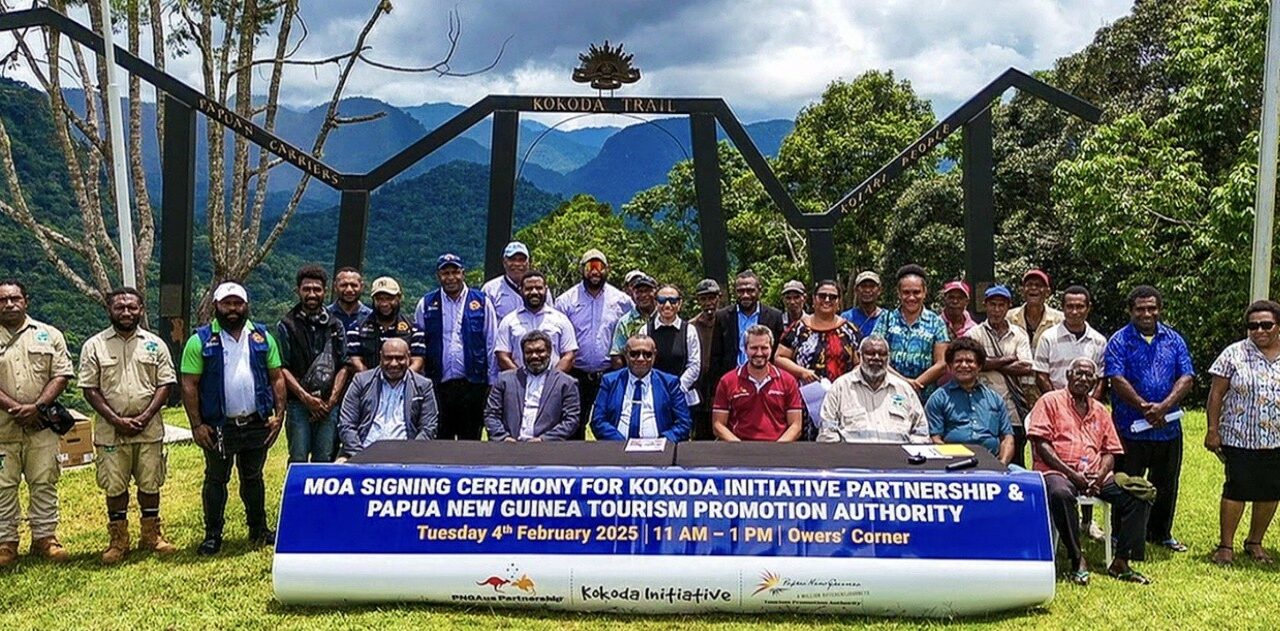This content has been archived. It may no longer be relevant
The colourful line-up at Owers Corner for the Kokoda Initiative announcement of a ‘Kokoda Sanitation Project’ on February 6, indicates this decision originated from Port Moresby based ‘swivel-chair managers’ linked to computer screens.
They were obviously unaware of their own ‘Kokoda Track Guesthouse’ projects report published 12 years earlier by ‘Ecosustainablity Consultants’ on behalf of the Kokoda Initiative in 2012, which advised that surveys conducted by TPA and KTA in 2010 revealed:
‘75% of trekkers surveyed were male; 59% of trekkers surveyed had engaged a personal porter; 99% of trekkers surveyed would recommend Kokoda to a friend; rainforest, PNG culture and meeting local people grow in importance after undertaking the trek; importance-performance analysis was included, with the quality of campsites and guesthouses most needing improvement (low importance prior to trekking, higher rating after trekking); and when asked what should be improved, toilets received a lot of unprompted mentions.’
The report also revealed the number of campsites far exceeded demand:
‘There are at least 87 campsites and guesthouses along the Kokoda Track. Based on estimated there are about 900 “beds” in trekker huts and guesthouses and about 1100 “beds” as tent spaces in campsites . . . the trekking season is nine months; there are 540,000 available bed nights, with a demand for 40,000 bed nights; and the occupancy rate overall is about 7 percent.’
According to the attached KTA records there were 3,597 trekkers in 2012 but this has fallen to 3,308 in 2023 – however, according to TPA, the number of campsites has grown from 87 to 95 which further increases the level of supply over demand!
Any management system that allows campsite numbers to increase while trekker numbers decrease will lead to the creation of false expectations by traditional landowners which, in turn, increases their frustration with deskbound bureaucrats linked to computer screens in distant KTA and TPA offices.
The failure of both the Tourism Promotion Authority (TPA) and the Kokoda Track Authority (KTA) to gather data since 2012 is a serious dereliction of their duty as public servants.
TPA also seems to be blissfully unaware of their own ‘Kokoda Track Guesthouse Audit Report’ (see below) in 2013 which advised:
“Overuse and overcrowding of campsites remains as a concern with several of the larger trekking companies relying on using a small number of pre-determined campsites.”
‘The location and frequency of use of some campsites along the Kokoda Track raises the question as to how sustainable some of these actually are.
‘Some campsites either have a very small number of trekkers using them in any given trekking season which others have had no trekkers stay for the entire length of the 2012 trekking season and may indeed have no paying guests in 2013 either. As the majority of trekking companies and tour operators have their preferential campsites it may be the case that some of these other less frequented properties are just simply not a sustainable business prospect. The certification committee may be able to look at this issue and consider any recommendations they can make or to even consider a KTA policy on location and use of particular sites.”
The campsite management situation has deteriorated further since then so if TPA proceeds with their plan to build two toilets at each of 95 unknown locations across the Trail as reported last week, many will never be used because tour companies no longer camp at many of these sites which are now derelict.
If TPA had bothered to consult with tour companies before dressing up for their photo-shoot at Owers Corner last week they would have been made aware of the reality of campsite usage across the Trail – a far more reliable source than shared ‘thought-bubbles’ on computer screens!
Nobody builds toilets before they build houses or hotels – the same should apply to campsites along PNGs most popular tourism destination!
The first priority should therefore be the development of a campsite plan which includes provision for kitchens, dining huts, drying huts, and toilets for both trekkers and their PNG support crews at the major locations used by tour companies – the KTA should be able to provide this data from their trek permit records.
Last week’s announcement smacks of a continuing neo-colonial approach to aid-funded projects across PNGs most popular tourism destination by the Australian Kokoda Initiative.
It's an absolute Kokoda'shitshow!'
For more information:
- Environment Bill for Kokoda – A suicide note for pilgrimage tourism on the Kokoda Trail
- A Blueprint for Kokoda Tourism




